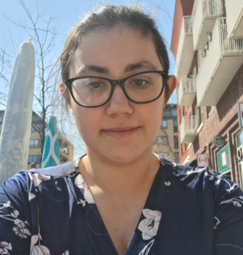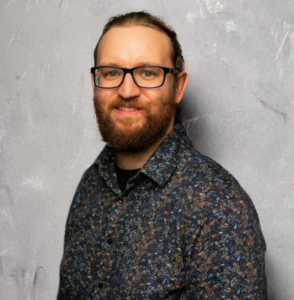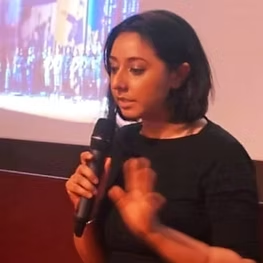
FRIS project: including neurodivergent students
Autistic voices are missing from both research and (research-based) education. UvA lecturer Dr Ileana Grama found this striking. Therefore, she wanted to develop a course on neurodiversity research. This became Neurodiversity: Participatory Action in Research and Education. Made possible by the Fair, Resilient & Inclusive Societies (FRIS) grant and conducted in collaboration with external lecturers Jonathan Evans Msc and Dr Kirandeep Kaur. Read on below to find out more about the project, the goals, motivation, challenges and more!
Would you also like to benefit from the FRIS grant? Apply before 31 January. Read more about the FRIS grant.

Dr Ileana Grama (Faculty of Humanities, Linguistics Capacity Group) is among a minority of researchers working on neurodiversity as a linguist and interested in autism and language development. She came up with the idea of developing a course on neurodiversity research. This became a reality when she started her FRIS project in spring/summer 2023 (3rd round of FRIS grants). She developed a new topic-related course at the UvA with the FRIS grant. For this, she collaborated with external lecturers Jonathan Evans MSc and Dr Kirandeep Kaur.

Jonathan is an expert by experience on neurodiversity, as he was diagnosed with autism in adulthood. His personal experience was an additional motivation to participate in this project.

Kirandeep is a freelance lecturer and course developer with expertise in participatory action research. She focuses on creating courses based on critical reflexive teaching strategies and participatory methods.
Project, aims and motivation
Course: Neurodiversity in Research and Education
Ileana, Jonathan and Kirandeep developed the course Neurodiversity: Participatory Action in Research and Education. With this course, they introduce students to the concept: co-creation with the community. This is a research method that is becoming increasingly relevant and necessary in society. Applied to the neurodivergent community, the method recognises divergent students in their need for more active involvement in tailoring education to their specific needs and goals. In addition to this course, the three organised Neurodiversity Cafés: intended for UvA lecturers to share advice on (neuro-)inclusive strategies in education.
Aim of the course
Jonathan explains the aim of the course: ‘The initial course design will introduce students to neurodiversity research and educational practices through a different lens. That is, its impact on neurodiverse communities and how these communities can participate in and shape this research. This is the design where, for the first time, a bottom-up approach to course design will take place. This is an innovation on the usual top-down approach to course development. The garden then has the right seeds to blossom because those seeds have been developed collaboratively.’ Find more about the course objectives in the Course Catalogue. (NB: This course is in English.)
Motivation for developing this course
The seed for this project was Ileana’s need to set up a new course. Jonathan joined as an expert by experience, as he himself was diagnosed with autism and he wanted to advocate for neurodiversity. Freelance teacher and course developer Kirandeep was also keen to collaborate on the project. She explains why: ‘I found the project interesting and saw this track as an opportunity to create a course based on critical pedagogy to support often neglected students. I hope our course will lead to more dialogue and inclusion of neurodivergent students, not just at UvA.’

Dr Ileana Grama:
‘I wanted to develop a course on knowledge co-creation in an area that has a great need for it: neurodiversity research.’
 Jonathan Evans Msc:
Jonathan Evans Msc:
‘As an autistic teacher who was diagnosed at an adult age, I am concerned with how the neurodiversity paradigm affects and is affected by education. The ‘garden’ is currently not very well maintained. This project can help maintain it better.’
Challenges
In this project, there are also challenges such as:
- The reaction of neurotypical fellow students. Neurotypical is the opposite of neurodivergent. It refers to people behaving in a way that is seen as ‘normal’. Ileana explains: ‘When I suggested ideas for the new course in existing courses or in conversations with students, I encountered enthusiasm from students with neurodiversity, but also prejudice from their neurotypical fellow students. Some students doubted whether autistic people actually have a community. Other students were sceptical about the scientific quality of participatory research.’
- Capital. Although the FRIS grant helped tremendously in setting up this project, Kirandeep thinks more is needed. ‘If you want real innovation in teaching practice, there must be better systems for rewarding and supporting educators, both within the UvA and with partner educators. Partnerships, like the one Ileana has created, are invaluable. We create more by connecting with others. It is the role of institutions to invest in the right way.’

Dr Kirandeep Kaur:
‘The grant allowed me to help set up a course that otherwise would not have existed. In this way, we were able to build inclusion in a meaningful and intentional way.’
More information
- Listen to Ileana Grama in a podcast about neurodiversity in the academic world and her aim for change: Neurodiversity in Academia – AIM for Change | Podcast on Spotify. (In this episode, we talk to Dr. Illeana Grama about Neurodiversity in Academia. What does it mean to be a neurodivergent student? What do universities do to enable inclusive learning? And what can still be improved in the future? Listen to find out!)
- Want to know more about the Fair, Resilient & Inclusive Societies (FRIS) grant, community and/or -events? Find out more about FRIS and join the group!






